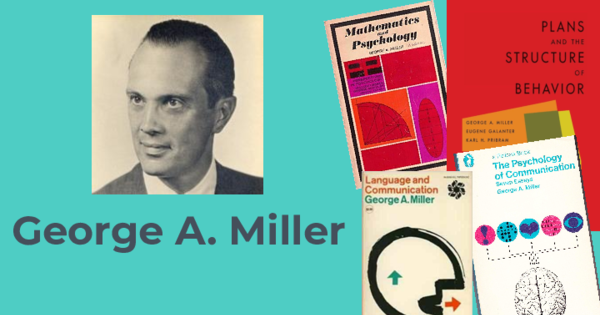The founding father of cognitive psychology: Who is George Armitage Miller?
According to “Miller's Law”, if the information is tried to be loaded into the short-term memory in a way that exceeds the 7 ± 2 rule, the capacity is exceeded and the human brain starts to make mistakes.

George Armitage Miller is an American psychologist, and one of the founders of cognitive psychology. He is best known for his contributions to the psychology of language and the cognitive sciences. Thanks to his theories about short-term memory, he is considered one of the founders of cognitive neuroscience. In 1956, a telecommunications company gathered hundreds of scientists to conduct various research.
George Armitage Miller (February 3, 1920 – July 22, 2012) was an American psychologist who was one of the founders of cognitive psychology, and more broadly, of cognitive science.
Psychologist George Miller also worked with this group. The group was tasked with experimentally figuring out how many random numbers a person could remember at any given time. If you're wondering why this information is important to a phone company, take a look at how many digits a phone number consists of without an area code. At the end of the study, Miller published an article. The title of the article was “Magic Number Seven, Plus or Minus Two: Some Limits of Our Information Processing Capacity”.
In this study, Miller emphasized that our ability to process information and make decisions is limited by a fundamental limitation. The article "Magic Number Seven, Plus or Minus Two" by Princeton University cognitive psychologist George Miller and published in the "Psychological Review" is considered the most cited article in the history of psychology. The publication states that "The amount of information the average person can hold in their memory is 7 ± 2".
In other words, the limit of our short-term memory is "seven plus minus two". This view is called “Miller's Law”. According to Miller's Law, if the information is tried to be loaded into the short-term memory in a way that exceeds the 7 ± 2 rule, the capacity is exceeded and the human brain starts to make mistakes. For example, if the practitioner starts to give too much information to the hypnotized person in hypnosis applications, after a while the memory capacity is exceeded and new orders begin to go to the unconscious.
This is called overloading in hypnosis. Likewise, as a sales strategy, when the seller begins to provide the customer with a large amount of information about the product, after a while, new information starts not to be memorized due to the exceeded capacity. The most repeated and emphasized words in this process, for example, “advantageous, cheap” etc. words become the only catchy words and motivate the customer more to buy the product. For example; If you try to memorize 34007145320121071 digit by digit, the memory capacity will be exceeded.
Instead, if it is divided into 5 groups 34, 007, 1453, 2012, 1071, and memorized, this information is processed more easily in short-term memory. The same is true for phone numbers, name groups, etc. also applies to
These items can be numbers or words, or they can be a group of related information. When the human brain memorizes information, it performs grouping. Related information is first grouped and then treated as a whole. This method ensures that short-term memory is used more effectively and its capacity is increased.
Short life story
George Armitage Miller was born in 1920 in the USA. He graduated from the University of Alabama with a bachelor's degree in English and verbal communication and completed his master's degree in oral communication at the same university in 1941.
Miller became interested in psychology while he was still a student, and although he did not take psychology courses, he gave an introductory psychology course to 16 grades at the University of Alabama. Miller, who said that he started to believe what he was told because he was told the same materials 16 times a week, worked on problems in verbal communication at the Harvard University Psychoacoustic Laboratory and completed his doctorate in 1946.
Behavioral psychology was considered the main school in the years when Miller began to take an interest in psychology. The adoption of this approach by major universities and important professionals and the conduct of studies in this field also affected Miller's perspective on psychology and he continued his first studies through this school.
He published Miller's famous article "The Magical Number Seven" in 1956, which is considered the beginning of Cognitive Psychology. In his article, Miller stated that in cases where coding, clustering, or any strategy is not used and in experimental conditions, the number of information that can be dealt with at the same time, noticed by the brain and processed into short-term memory is seven, and this number may decrease to five in some people, or increase to nine in others.
Miller passed away in 2012.
